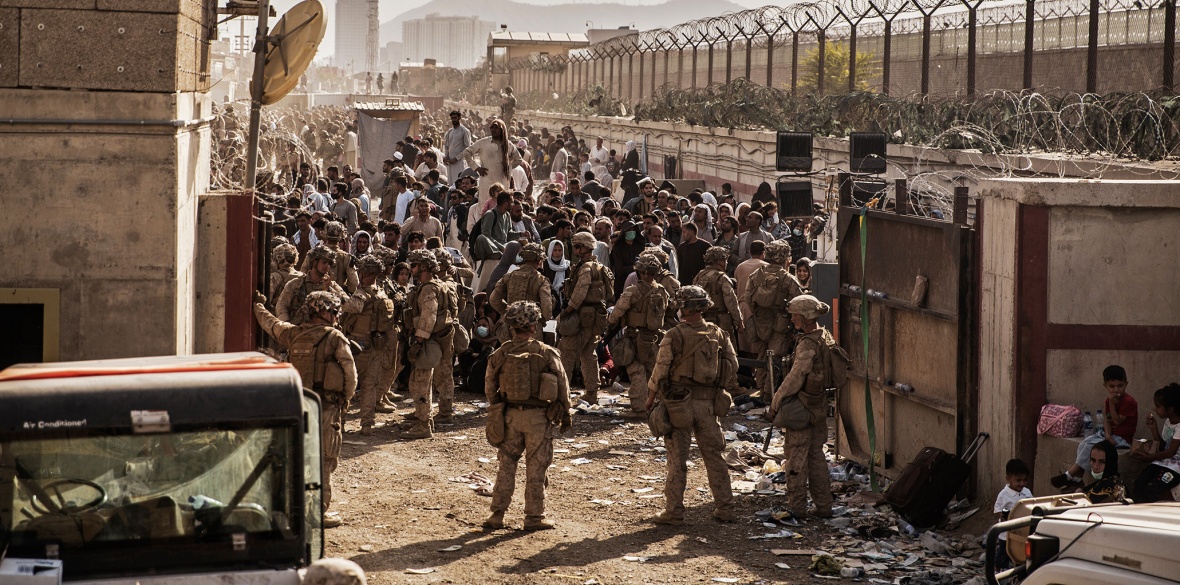This is the last article you can read this month
You can read more article this month
You can read more articles this month
Sorry your limit is up for this month
Reset on:
Please help support the Morning Star by subscribing here
EMPIRES advance and empires retreat, though not in circumstances of their own choosing — to borrow from one Karl Marx — and certainly never smoothly or without upending entire regions, countries and societies in their wake.
What has and continues to unfold in Afghanistan is nothing less than a historic tipping point when it comes to US hegemonic and imperial decline.
The chaotic and panicked scenes of mayhem being beamed across the world from Kabul airport, where US and British military forces are hastily attempting to effect the evacuation of their own nationals still in the country, along with Afghans who made the mistake of working for them during the country’s occupation, have rightly drawn comparison with Saigon in 1975.
Just as Saigon marked the humiliating defeat of US geostrategic ambitions in Indochina after 10 years of war and conflict in a country it never had any right to be in, so Kabul marks the humiliating defeat of same in central Asia.
Making the “fall of Kabul” today more significant than the fall of Saigon back then, though, is the fact that the former comes at the tail end of Washington’s unipolar moment, when after the Berlin Wall came crashing down, Western ideologues and neocons in Washington became intoxicated with triumphalism and “End of History” fanaticism.
At this historical juncture, the world appeared to them like a freshly cooked steak dinner, just waiting to be devoured.
The Grand Chessboard is the title of the 1997 book by former national security adviser to president Jimmy Carter in the late 1970s, Zbigniew Brzezinski.
In it he argues that domination of Eurasia should be viewed as critical to US strategy for domination of the world’s resources in the post-cold war era.
Brzezinski was key in advocating US military and material support for the Afghan mojahedin, which began under the Carter administration in 1979 in order to draw the Soviets into their own Vietnam.
The trajectory from then to now has been one of imperial overreach on the part of a Washington Establishment blinded by an entirely misplaced sense of its own exceptionalism and a catastrophically failed belief in its ability to bludgeon and bully the world into submission.
“You have the watches, we have the time,” the Taliban leadership is said to have pointed out to their US counterparts, and so it has proved.
With hardly a shot being fired, and with the 20th anniversary of September 11 looming, the Taliban’s return to power in Afghanistan is not only seismic geopolitically but also just as importantly, symbolically.
Sadly, it is the innocent in Afghanistan who have suffered most and who will continue to suffer most going forward. Meanwhile, the same old hypocrisy abounds.
Western commentators lamenting the fate of women in Afghanistan under Taliban rule are completely silent when it comes to the fate of women in Saudi Arabia.
Politicians beside themselves with grief over the fall of Kabul have shed not a tear over the destruction of Yemen.
Korea, Vietnam, Nicaragua, El Salvador, Afghanistan, Iraq, Libya, Syria — wherever Washington treads foot, ruination follows as night follows day.
Moreover, the history of US betrayal of former allies and proxies is a long and ignoble one.
Afghans who made the mistake of trusting US promises and assurances failed to learn from the fate of the Kurds, who themselves failed to learn from the fate of the South Vietnamese.
When it comes to Afghanistan and the wider region in the here and now, Washington and its allies have proved after two decades that they have nothing to offer but misery and despair.
Now into the vacuum must step China, Iran, Russia and Pakistan, regional powers with a vested interest in stability and security being returned to a society and people that have known only its lack over four long decades of turmoil and strife.
With yet another refugee crisis triggered by another failed US-led Western crusade, the world must demand that all sanctions on Iran are lifted, a country which even before the collapse of US power in Afghanistan was already home to over two million Afghan refugees.
If countries such as Iran and Pakistan are to bear the brunt of a humanitarian crisis fashioned in Washington, they are entitled to expect Washington to at least acknowledge its responsibility and act accordingly.
No-one in Islamabad or Tehran will be holding their breath, of course. This, after all, is less a country that acts according to moral principles, and more an amoral hegemonic juggernaut.
President Joe Biden fatuously believed that a US-trained, funded and equipped Afghan army could hold the line against the poorly trained, funded and equipped Taliban insurgency.
How wrong he and his intelligence were, confirming that after 20 years’ presence in Afghanistan they still had little or no understanding of Afghan society and its complexities.
Just as Rome’s emperors erroneously believed in the universality and divine permanence of Rome as the sun around which the rest of the world revolves in its time, so US presidents have made the mistake of believing the same myth in ours.
Afghanistan throughout its tortured history been a graveyard for such myths.
The Greek empire of Alexander the Great, the British empire, the Soviet Union, all have exited the country grievously diminished and weakened compared to when they entered.
The US empire of our time now joins them.










